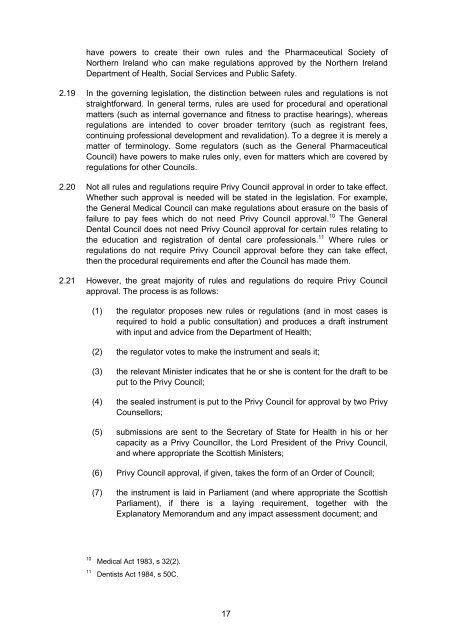Regulation of Health and Social Care Professionals Consultation
Regulation of Health and Social Care Professionals Consultation
Regulation of Health and Social Care Professionals Consultation
Create successful ePaper yourself
Turn your PDF publications into a flip-book with our unique Google optimized e-Paper software.
have powers to create their own rules <strong>and</strong> the Pharmaceutical Society <strong>of</strong><br />
Northern Irel<strong>and</strong> who can make regulations approved by the Northern Irel<strong>and</strong><br />
Department <strong>of</strong> <strong>Health</strong>, <strong>Social</strong> Services <strong>and</strong> Public Safety.<br />
2.19 In the governing legislation, the distinction between rules <strong>and</strong> regulations is not<br />
straightforward. In general terms, rules are used for procedural <strong>and</strong> operational<br />
matters (such as internal governance <strong>and</strong> fitness to practise hearings), whereas<br />
regulations are intended to cover broader territory (such as registrant fees,<br />
continuing pr<strong>of</strong>essional development <strong>and</strong> revalidation). To a degree it is merely a<br />
matter <strong>of</strong> terminology. Some regulators (such as the General Pharmaceutical<br />
Council) have powers to make rules only, even for matters which are covered by<br />
regulations for other Councils.<br />
2.20 Not all rules <strong>and</strong> regulations require Privy Council approval in order to take effect.<br />
Whether such approval is needed will be stated in the legislation. For example,<br />
the General Medical Council can make regulations about erasure on the basis <strong>of</strong><br />
failure to pay fees which do not need Privy Council approval. 10 The General<br />
Dental Council does not need Privy Council approval for certain rules relating to<br />
the education <strong>and</strong> registration <strong>of</strong> dental care pr<strong>of</strong>essionals. 11 Where rules or<br />
regulations do not require Privy Council approval before they can take effect,<br />
then the procedural requirements end after the Council has made them.<br />
2.21 However, the great majority <strong>of</strong> rules <strong>and</strong> regulations do require Privy Council<br />
approval. The process is as follows:<br />
(1) the regulator proposes new rules or regulations (<strong>and</strong> in most cases is<br />
required to hold a public consultation) <strong>and</strong> produces a draft instrument<br />
with input <strong>and</strong> advice from the Department <strong>of</strong> <strong>Health</strong>;<br />
(2) the regulator votes to make the instrument <strong>and</strong> seals it;<br />
(3) the relevant Minister indicates that he or she is content for the draft to be<br />
put to the Privy Council;<br />
(4) the sealed instrument is put to the Privy Council for approval by two Privy<br />
Counsellors;<br />
(5) submissions are sent to the Secretary <strong>of</strong> State for <strong>Health</strong> in his or her<br />
capacity as a Privy Councillor, the Lord President <strong>of</strong> the Privy Council,<br />
<strong>and</strong> where appropriate the Scottish Ministers;<br />
(6) Privy Council approval, if given, takes the form <strong>of</strong> an Order <strong>of</strong> Council;<br />
(7) the instrument is laid in Parliament (<strong>and</strong> where appropriate the Scottish<br />
Parliament), if there is a laying requirement, together with the<br />
Explanatory Memor<strong>and</strong>um <strong>and</strong> any impact assessment document; <strong>and</strong><br />
10 Medical Act 1983, s 32(2).<br />
11 Dentists Act 1984, s 50C.<br />
17
















